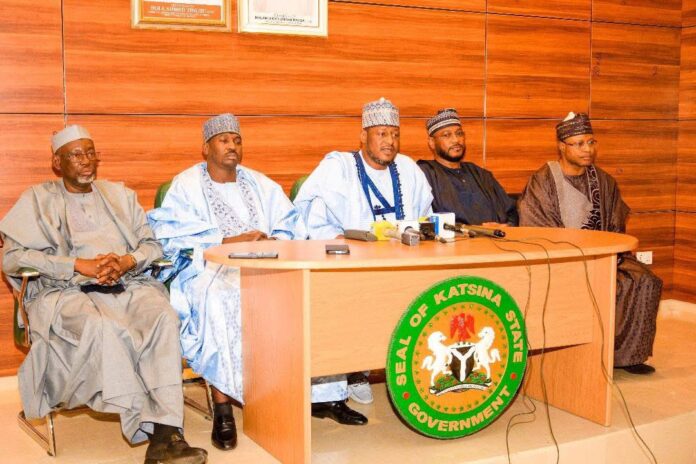In a powerful display of solidarity, the Governors of the North West region have expressed their unequivocal support for President Bola Ahmed Tinubu’s economic policies, declaring their commitment to collaborate on initiatives that seek to lift the region out of poverty and drive sustainable development.
This declaration was made during a crucial meeting held yesterday at the Katsina Governor’s Lodge in Asokoro, Abuja. The session, presided over by Dr. Dikko Umaru Radda, Governor of Katsina State, brought together several key figures from the North West Governors Forum, including Governor Uba Sani of Kaduna, Dauda Lawal of Zamfara, Ahmed Aliyu of Sokoto, and Umar Namadi of Jigawa. The meeting was also graced by notable representatives from the United Nations, including Amina Mohammed, the Deputy Secretary-General of the UN, and UN Resident Coordinator Mohammed Malik Fall.
“The region has spoken,” said Dr. Dikko Umaru Radda, addressing the media after the closed-door meeting. “We are fully committed to supporting President Tinubu’s economic policies. These policies are in line with our vision for a prosperous future for the North West and the entire nation.”
Radda emphasized that the region’s governors were not just offering verbal support but were actively partnering with the UN and various development agencies, including the African Development Bank (AfDB), to execute tangible projects on the ground. The focal point of their collaboration, Radda revealed, is Agriculture 2.0 – an ambitious agricultural initiative aimed at revolutionizing farming practices across the region.
“Through the partnership with the UN, we are targeting the agricultural sector, with a particular focus on the North West States. The project starts with Kaduna and Kano but is set to spread to all states in the region,” Radda explained. “Agriculture remains a critical part of our regional economy, and we are working tirelessly to enhance production, empower farmers, and create jobs, especially for our growing youth population.”
The governors, united in their mission, are also tackling critical issues such as child education and unemployment. In the face of staggering poverty levels and a growing population, the North West governors have set ambitious goals to improve literacy rates and combat the high levels of out-of-school children.
Radda highlighted the importance of cooperative governance and emphasized that these initiatives would not only benefit the region but also contribute to the larger goal of national economic development. “We are working together in harmony to implement policies that will boost agriculture, enhance education, and create much-needed employment opportunities for our youth,” he said.
The North West states, which have long grappled with poverty, security challenges, and infrastructure deficits, are now rallying behind a unified approach to solving these deep-rooted issues. President Tinubu’s economic policies, Radda affirmed, are an essential pillar of this strategy.
“The support of President Tinubu’s economic vision is unwavering across the North West. This is not just a political stance; this is a collective commitment to economic prosperity for our people,” Radda reiterated.
A significant development from the meeting was the confirmation of Hajiya Maryam Musa Mohammed as the new Director-General of the North West Development Forum. Mohammed’s appointment is seen as a strategic move to ensure effective coordination among the various development partners working with the region’s governors. “This appointment will strengthen the coordination efforts of the forum and enhance our ability to achieve our goals,” Radda said.
Additionally, the governors have appointed focal persons from each state to liaise with development partners and ensure the smooth implementation of programs designed to uplift the region. The move signifies the governors’ determination to move beyond mere promises and lay down a concrete plan for sustainable development.
With the North West region, home to over 40 million people, facing challenges such as low literacy rates, inadequate healthcare, and high unemployment, the governors’ commitment to addressing these issues has been widely praised. Analysts believe that the collaborative efforts between the North West governors and the United Nations, alongside Tinubu’s economic reforms, could be the key to unlocking long-term prosperity in the region.
The collaboration comes at a critical time, as Nigeria faces economic challenges, including inflation, unemployment, and external debts. President Tinubu’s policies, which emphasize reforms in agriculture, energy, and infrastructure, have been met with both praise and skepticism. However, the unanimous support from the North West Governors reflects growing confidence in the President’s approach to tackling the country’s economic issues.
One of the central themes of the governors’ declarations was the commitment to fighting poverty. With large swaths of the North West region still grappling with abject poverty, the governors have identified economic empowerment through agriculture and education as key components of their strategy.
“We are fully aligned with the President’s vision for the nation’s economic transformation. His policies have the potential to positively impact the livelihoods of millions of Nigerians, particularly those in the North West,” said Governor Uba Sani of Kaduna State, echoing the sentiment shared by his colleagues.
The agricultural push, led by initiatives such as Agriculture 2.0, aims to modernize farming in the region by introducing new technologies, improving irrigation systems, and providing farmers with better access to markets. Radda believes that these measures will make the North West a key player in Nigeria’s agricultural export market.
“We must ensure that our people are equipped with the tools, resources, and training they need to thrive,” Radda emphasized. “Through partnerships with organizations like the AfDB, we are making strides toward that vision.”
The North West governors’ unity in supporting President Tinubu’s economic agenda is seen as a major political development, signaling a unified front in the region at a time when Nigeria is navigating through complex economic challenges. Their commitment to working together on key issues such as agriculture, education, and youth employment could mark a turning point for the North West, an area often overlooked in national development discourse.

